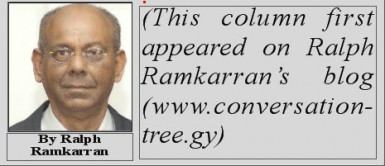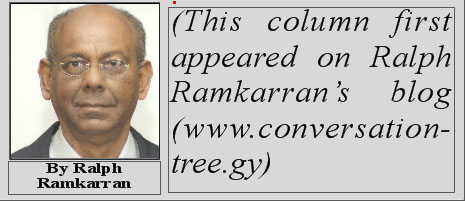No matter how often it happens, no matter how much our ears become attuned to the ring of abuse in politics, Guyanese must never allow themselves to become accustomed to it or to be entrapped by it, and to succumb to the temptation of silence. The degeneracy of political and personal abuse has become the hallmark of the PPP’s methodology of political discourse.
Unless it stops, it will intimidate most into silence. For the few who remain courageous enough, they will have to live, as many now do, with a constant, daily, stream of invective about their public and private lives and activities that defies any sense of rationality or decency. Little do the perpetrators understand that it is they, not the victims, whom the degradation eventually consumes. Cheddi Jagan suffered a lifetime of humiliation and abuse. So intense it was, and over so many decades, that it tempted good people to say that history would not have been kind to him. The opposite has happened.
The President, in a moment which he “vaguely remembers,” exposed the sinister grip and origin of the culture of abuse and intimidation when he threatened John Adams who was heckling at a meeting in Aishalton that “Jagdeo” would have slapped him if he were there. The nature of the culture is now clearly in the process of advancing from words to fists. Unless checked, the threat of physical harm would eventually gain dominance over that of verbal abuse.

Positive effect there was. Yesterday’s headlines report that the Foreign Minister reported to Caricom that an announcement by the President about a date for elections is “imminent.” If it is that the High Commissioner’s press conference was responsible for that intervention, then he has done a good service for Guyana. Many will believe that without this kind of public pressure, the prorogation would last much longer than would otherwise be the case.
The continuing failure to resolve Guyana’s political crisis is having a deleterious and debilitating impact on the Guyanese people who are disconcerted by the continuing political gridlock and instability. They do not want elections. They want a solution. But if hard-headedness on the issue of a coalition government is obstructing a solution and elections are the only way out then they want the prorogation to end and a date for elections to be set. The diplomatic community has obviously decided to weather the storm of abuse.
The British High Commissioner called for an end to the prorogation. He said that Guyana was in violation of the Commonwealth Charter. He also said that discussions were going on ‘in London’ about Guyana’s violation of the Charter. He never said that those discussions are engaging the Commonwealth. For that he was castigated as an outcast (pariah). I wonder if Dr Luncheon is aware that the origins of the meaning of the word lie in the caste system. It appears that PPP leaders are now so imbued with the culture of caste that it informs their discourses.
There were also hints that the High Commissioner may have colluded with the European Union’s withdrawal of its budgetary support. This is the first time that Guyana is becoming aware that the European Union has withdrawn this support. The public does not know the reason for it. In the absence of an explanation speculation will be rife that sanctions are being applied to Guyana. The nature of Dr Luncheon’s hint against the alleged collusion of the High Commissioner and his condemnation of sanctions generally suggest that the act of the European Union may have a connection with Guyana’s prorogation of the National Assembly and failure to fix a date for its resumption. If foreign governments are beginning to take sanctions against Guyana, it is time that more voices are heard about Guyana’s political crisis. The only people who will suffer if sanctions are imposed are the people of Guyana.





